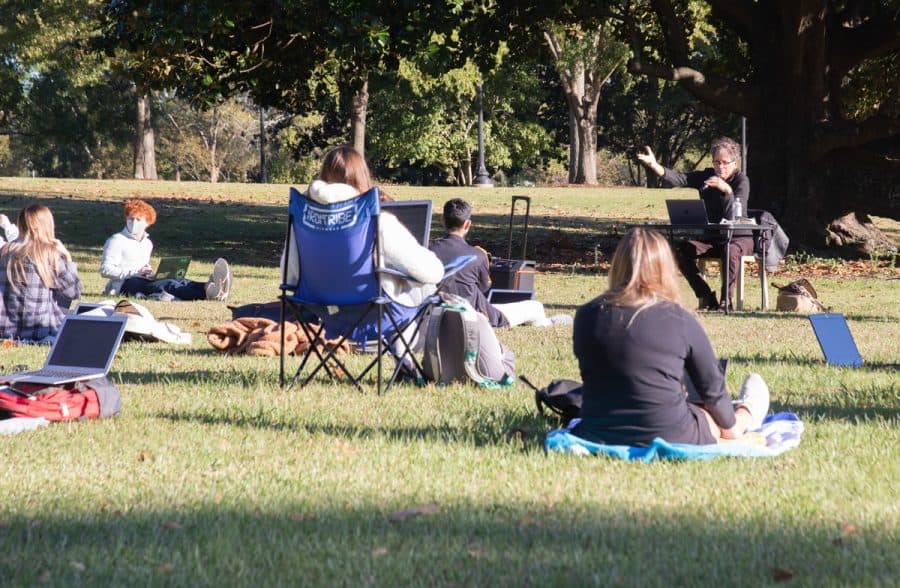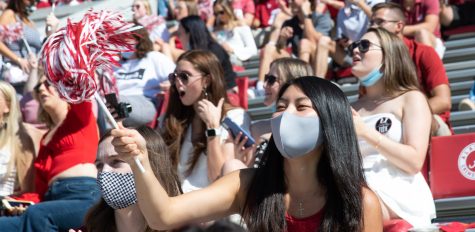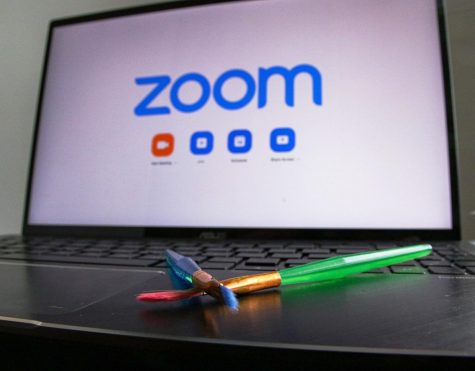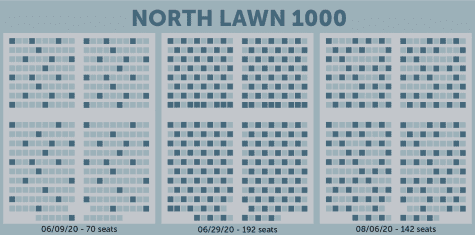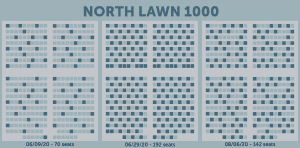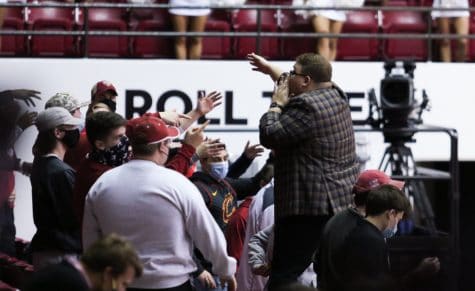‘If you build it, they will come’: Meet the GTA championing outdoor learning on campus
Andrew Ash wasn’t going to let a pesky pandemic get in the way of his goals for a robust, conversational class.

More stories from Tara Davenport | @tara_davenport
In the midst of the COVID-19 pandemic, Andrew Ash, a graduate teaching assistant in The University of Alabama English Department, sought permission to hold all of his classes in the shade of a magnolia tree between North Lawn Hall and Bryce Main. It’s an unconventional approach that’s paid off – one that Ash aptly compared to Ray Kinsella’s baseball field in the iconic film “Field of Dreams.”
“Until, normally, like 2:30 [p.m.], there’s nothing here,” Ash said. “Then I pull up with my truck… and then, slowly, students appear from all directions, and eventually we’ve got a ballgame. Then class ends, and five minutes later, there’s nothing here, and it’s as if nothing ever happened, but of course it did.”
Of this semester’s more than 30 sections of English Literature 1, Ash’s is the only section that doesn’t meet virtually. Ash also teaches this semester’s only section of English Composition 2 that meets in-person for each session.
Ash builds his proverbial baseball diamond with just a table, wooden chair and portable speaker as students join him, sprawling out on blankets and in folding chairs one by one. In the shade of that tree, the most valuable resource is one they don’t have to bring or pay for, and one that there is more than enough of: space.
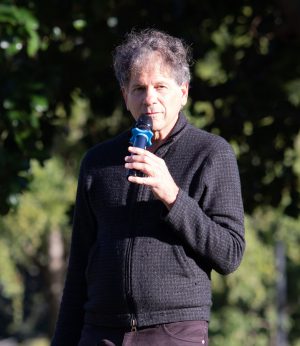
Everyone must sit at least six feet apart and wear face coverings for the duration of the class, but Ash and his students use microphones to minimize the feeling of distance between them and preserve a discussion-based format, which has been one of Ash’s biggest goals.
His unconventional approach grew from a deep appreciation for personal interaction and a desire to preserve the traditional classroom experience for students during a time when indoor spaces aren’t safe for large groups of people.
“From my perspective, the University has really missed an opportunity in not having more classes held outside,” Ash said. “It allows classes to meet in full, in person. Holding classes inside makes it much harder to achieve that. Out here, I feel safer and students feel safer.”
Ash said the University’s campus and weather lend themselves to outdoor instruction more than most, and so far, students have been perfectly comfortable outside.
However, Ash does acknowledge a need to reevaluate as the temperature starts to drop, especially seeing as how he hopes to hold his classes outdoors again next semester.
“Dealing with the cold in January and February is still an issue that I have not fully resolved,” Ash said. “I don’t think it makes sense to be outside when it is windy, but otherwise, I’m thinking that around 47 degrees is probably where the cut off point should be once students adjust to dealing with winter. I think heaters would be very helpful, and I will fund them out of my own pocket if I need to.”
Ash’s classes meet via Zoom when it’s raining or otherwise uncomfortable outside, but he’s concerned that starting a semester that way would make it more difficult to build rapport and encourage interactivity.
“I will do everything I can to have an in-person experience from the start, next semester,” Ash said. “In the meantime, I may scout out alternative locations to see if there are any that would provide more shelter from the wind while still enabling an interactive learning experience.”
However, Ash would like more support from the University as he continues. Although Ash’s request to teach his classes outdoors was approved by his superiors, he was disappointed in what he described as a lack of effort on their part in advocating for his approach or encouraging other instructors to try it.
“There was very little sense of the University as a whole embracing this, or thinking it was a good idea or seeing it as a way to do better by our students,” Ash said. “We have no idea how long this is going to last. So I’m hopeful that the University will see this and say, ‘We can do better. We can actually embrace this and support this.’ It’s a missed opportunity. They could and should do more. And students could benefit more from it.” ![]() Loading ...
Loading ...
Luke Niiler, director of the first year writing program within the English Department, helped Ash secure funding for a Wi-Fi hotspot and expressed enthusiastic support for Ash’s approach. However, he doesn’t appear to have taken any other concrete steps to develop or endorse it as of now.
Niiler oversees all English composition sections, including Ash’s, but his purview does not include Ash’s English Literature I section. Niiler suggested that support for the idea would have to come from above him.
“I think that if Andrew wanted to pursue this into next year, into the spring, I’d be completely supportive of that,” Niiler said. “But, you know, in initiatives like this, you’re working from a much stronger position if you have not just one single instructor’s commitment, but an institutional commitment… But maybe it’s something I could float to my department’s faculty senate representative. I mean, maybe that’s where we could get some traction for something like this.”
Ash and Niiler did share one concrete suggestion, which was to seek permission to use the University’s gameday equipment.
“They [the administration] use[s] the outdoor spaces mostly just for game days, for tailgating,” Ash said. “There’re lots of tables and tents. I know it may seem sacrilegious to suppose that you can actually use these tents for non-game day purposes, or, god forbid, use Bryant-Denny for classes. But I think, at least naively, that it’s a loss of opportunity.”
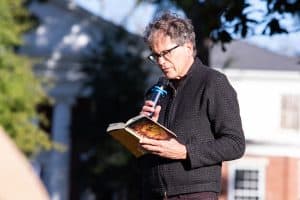
Niiler agreed, adding that even if instructors didn’t want to consistently meet outside, it could at least be arranged for them to be able to reserve tents and space heaters when they’d like to.
“I say, you know, if UA can arrange for tents to be set up on the quad for gameday, then certainly, you know, for their own students’ curricular pursuits, this should be a no-brainer,” Niiler said. “I would much rather teach under a tent, in a rainstorm, in February, on the quad, right, than in a tiny classroom in B.B. Comer… We’ve learned that much about the virus by now.”
Many of Ash’s students share Niiler’s sentiment.
“I think it’s nice that we can still interact with students like this,” said Erica Zito, a junior majoring in finance. “It makes me feel like I’m in a class.”
However, Zito acknowledged that outdoor learning might not be realistic for all courses, depending on the format.
“I think it depends on the kind of class,” Zito said. “For classes with intense notes, I’d rather be on Zoom so I can take notes at my desk.”
However, the arrangement has, thus far, been conducive to Ash’s courses, which are centered around reading, analysis and conversation.
Ash characterized his English Literature 1 students’ participation and attention as about the same as in a traditional classroom environment, suggesting that the outdoor environment, though more unpredictable, hasn’t negatively impacted their learning experience.
In fact, some students find it favorable to a virtual classroom experience.
“I wouldn’t have taken it if it was online,” Spencer Segal, a sophomore majoring in biology, said.
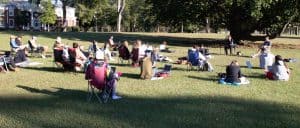
As the pandemic persists, the necessity for long-term solutions becomes more apparent. The University has already designated which courses will be offered in-person next semester, and which will need to be taught virtually or asynchronously, but Ash remains hopeful that his approach might soon be recognized for its benefits and utilized on a larger scale.
Even after the pandemic, Ash would like to continue teaching outdoors. Niiler approves.
“I mean, the Ancient Greeks taught outside,” Niiler said. “They walked with their students as they talked, you know, it’s even Biblical. I mean, you always read stories of Jesus and the disciples walking somewhere, and he’s teaching them. So Andrew’s in very good company.”

